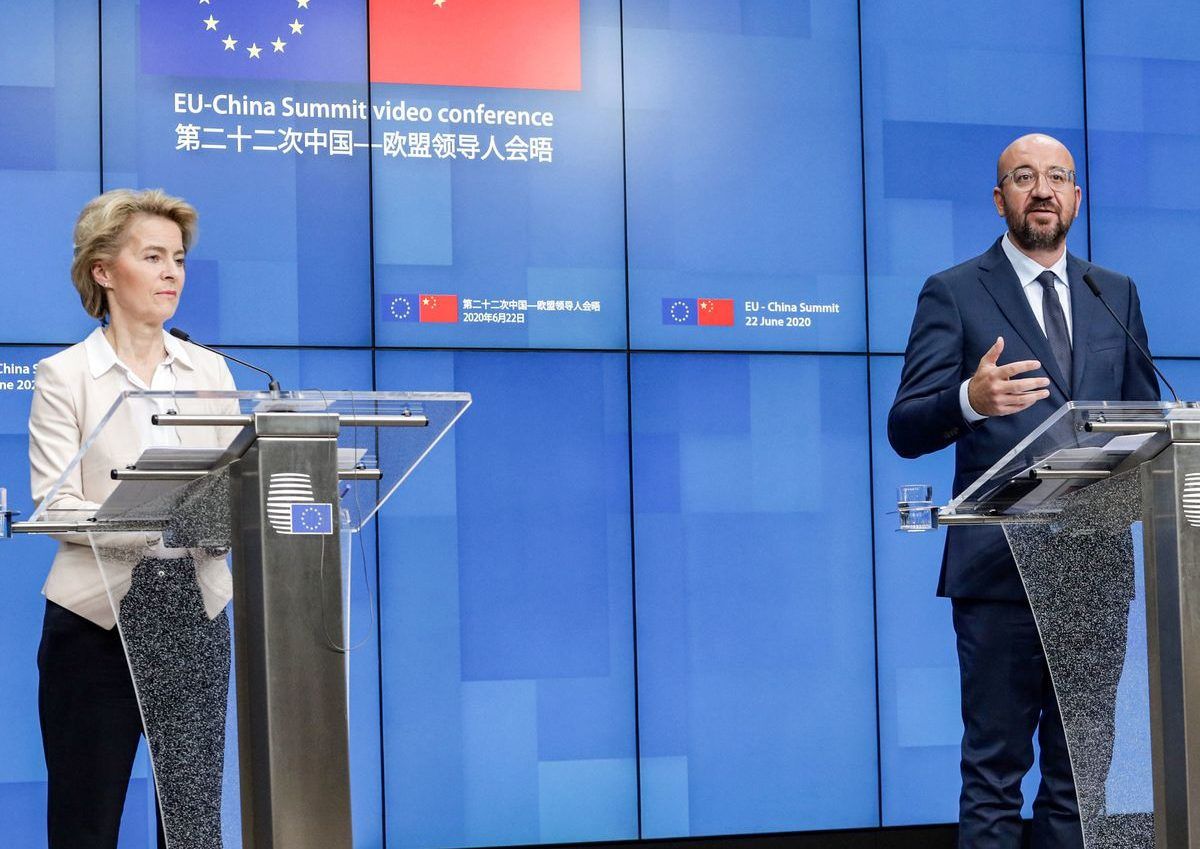EU and China address issues during tense summit meeting

A few minutes every morning is all you need.
Stay up to date on the world's Headlines and Human Stories. It's fun, it's factual, it's fluff-free.
On Monday, the European Union (EU) and China held a video summit meeting, marking their first formal talks since tensions spiked over the EU’s disapproval of Beijing’s management during the initial stages of the coronavirus outbreak.
The video conference was held between European Commission President Ursula von der Leyan, European Council President Charles Michel, EU’s chief executive and chairman, Chinese Premier Li Keqiang and President Xi Jinping.
The meeting covered multiple aspects of the EU-China bilateral relations, including trade, climate change and China’s actions in special autonomous regions (SAR), Hong Kong.
When the EU touched on trade matters, officials implored China to open up their economy wider to European firms and address their “unbalanced trade and investment relationship.” This comes after the EU-China summit meeting last year where both parties had agreed to allow fairer investment opportunities for European companies operating in China.
EU representatives have expressed concerns over unfair discrimination against European companies, citing China’s trade deal with the United States under which Beijing has committed to purchasing US$2 billion worth of US goods.
“We have not made the progress we aimed for in last year’s summit meeting statement in addressing market access barriers,” said von der Leyan in a news conference.
“We also need to have more ambition on the Chinese side in order to conclude negotiations on an investment agreement,” she added.
Also on the agenda were issues surrounding climate change, with reference to China’s supporting stance toward the 2016 Paris Agreement.
China is one of the world’s largest contributors to carbon emissions and according to the EU, emission levels are still growing. Although the EU leaders acknowledged China’s support for global climate issues, they also insist that their growing influence as a world leader “brings responsibility to follow up with actions.”
“We count on China to live up to its commitments under the Paris Agreement and step them up and lead by example,” said von der Leyan.
The summit meeting also looked into the widespread concern within the global community over China’s intent to enact a national security law in Hong Kong that would punish acts of sedition, subversion and secession, as well as foreign interference in the city’s affairs.
Last week, the G-7 country alliance, which includes EU members Italy, France and Germany, issued a statement calling on China not to follow through with the Hong Kong National Security Legislation which they fear would “curtail and threaten the fundamental rights and freedoms” of the Hong Kong people.
At the summit meeting, the EU chiefs echoed their G-7 partners’ “grave concern” about the proposed security law for Hong Kong, which they worry will jeopardize Hong Kong’s semi-autonomous status and role as a global financial hub.
“We expressed our great concerns about the proposed national security law for Hong Kong,” Michel said after the talks, adding that the bloc called on Beijing to ensure political pluralism, democratic standards and human rights in Hong Kong.
“We also conveyed that China risks very negative consequences if it goes forward with imposing the law,” van der Leyan said separately. However, she refrained from providing details on the specific consequences that may be imposed. Among the bloc’s members, only Sweden has proposed European sanctions on China if it proceeds to enact the security law.
Speaking on Sino-European relations, von der Leyen also explained that “the relationship between the EU and China is simultaneously one of the most strategically important and one of the most challenging that we have.”
In representation of that challenging relationship, the EU has faced increasing pressure from the US to take a tougher stance on China, with the nation bloc joining forces with the Western superpower in motions such as the G-7 statement about Hong Kong’s national security, as well as the Inter-Parliamentary Alliance on China (IPAC) launched earlier this month.
On the other hand, after the summit meeting, Chinese state media portrayed a more optimistic account of the talks, with President Xi stating that “cooperation is far bigger than competition.”
“China is a partner, not a rival,” Xi told the EU leaders, according to state media.
It was also reported that Premier Li had said that the two sides should work together to maintain stable supply chains as part of efforts to improve their trade relationship as well as minimize the economic impact of the pandemic.
“As for the China-EU investment agreement, Chinese and EU leaders noted that the talks have achieved progress, and repeated their efforts to reach the agreement within 2020,” said Li according to a statement posted on the Chinese government website.
“Leaders from both sides [are] expected to reach a high-level and ambitious agreement, and agreed to take [the] greatest efforts to reach consensus on the rules in fair competition and other areas,” the statement added.
Have a tip or story? Get in touch with our reporters at tips@themilsource.com




Comments ()